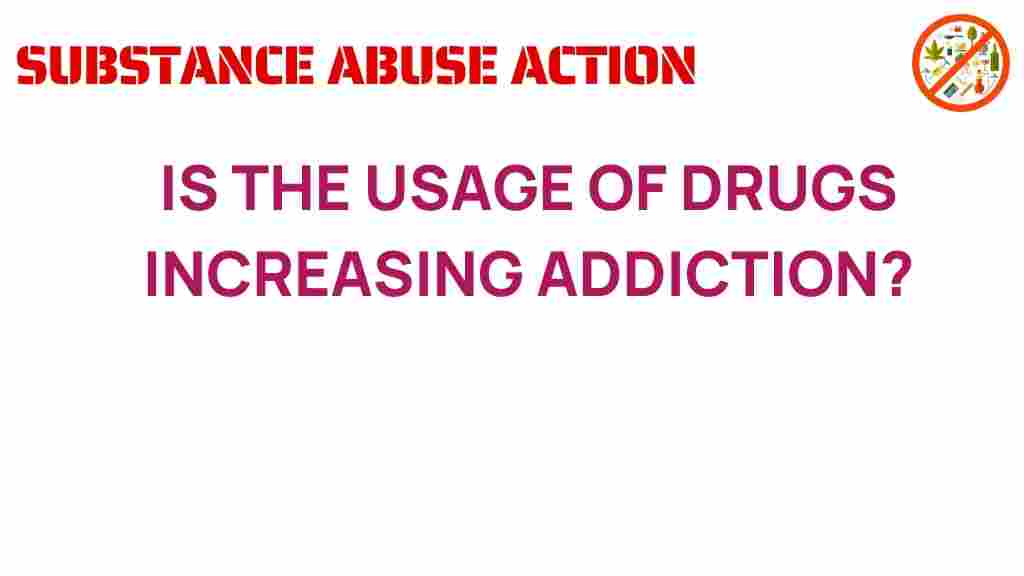Unraveling the Link: Are Rising Drug Usage Rates Fueling Addiction?
The alarming rise in drug usage rates across the globe has sparked a significant public health crisis. As communities grapple with the ramifications of escalating addiction rates, it becomes imperative to understand the intricate relationship between increased substance abuse and the pervasive health challenges it poses. This article seeks to delve into this pressing issue, exploring the causes, effects, and potential solutions to mitigate this crisis.
The Current Landscape of Drug Usage
Recent statistics reveal a stark reality: drug usage is on the rise. Various factors contribute to this surge, including:
- Societal changes: Shifts in societal norms and attitudes towards drugs can lead to increased experimentation and usage.
- Mental health issues: A growing number of individuals are turning to substances as a coping mechanism for mental health challenges.
- Access to substances: The availability of drugs, especially prescription medications, has increased substantially.
Understanding these factors is crucial in addressing the root causes of addiction and developing effective prevention strategies.
Understanding the Link Between Drug Usage and Addiction Rates
The link between rising drug usage and increasing addiction rates is complex. Here’s a breakdown of how these two elements are interconnected:
- Escalation of Usage: As more individuals experiment with drugs, the likelihood of developing a dependency increases.
- Threshold of Addiction: Certain substances have a lower threshold for addiction, meaning that even casual use can quickly escalate into abuse.
- Cultural Acceptance: In some communities, drug use is normalized, which further propels substance abuse.
Research indicates that early exposure to drugs significantly raises the risk of addiction. Adolescents, in particular, are vulnerable, as their brains are still developing, making them more susceptible to the effects of drugs.
The Societal Impact of Rising Addiction Rates
The consequences of increased addiction rates extend beyond the individual, affecting families, communities, and society at large. Key impacts include:
- Increased healthcare costs: The burden on healthcare systems grows as more individuals seek treatment for addiction-related issues.
- Strain on communities: Higher crime rates and social instability often accompany rising drug usage.
- Family disruptions: Addiction can lead to strained relationships, child neglect, and familial breakdowns.
Addressing these societal impacts is essential for fostering healthier communities and reducing the stigma associated with substance abuse.
Prevention Strategies to Combat Rising Drug Usage
Preventing substance abuse is crucial in curbing the increase in addiction rates. Effective strategies include:
- Education and Awareness: Informing the public about the dangers of drug use and the signs of addiction can empower individuals to make informed decisions.
- Community Programs: Engaging communities in prevention programs that address the root causes of drug usage can foster resilience.
- Support for Mental Health: Providing adequate mental health resources and support can reduce the reliance on drugs as coping mechanisms.
For more information on community-driven prevention initiatives, check out this resource.
Treatment and Recovery: Pathways to Healing
For those already affected by addiction, access to effective treatment is essential. The recovery process can be multifaceted, involving:
- Detoxification: The first step for many is detox, where individuals are safely withdrawn from substances under medical supervision.
- Therapy and Counseling: Behavioral therapies can help address the underlying issues related to addiction and teach coping strategies.
- Support Groups: Peer support plays a vital role in recovery, offering shared experiences and encouragement.
Recovery is a lifelong journey, and ongoing support is crucial for maintaining sobriety. Programs like Alcoholics Anonymous (AA) and Narcotics Anonymous (NA) have proven to be effective for many.
Addressing Mental Health in the Context of Substance Abuse
The intersection of mental health and substance abuse is an area of concern. Many individuals struggling with addiction also face mental health challenges, such as:
- Depression: Many people use drugs to self-medicate their depressive symptoms.
- Anxiety: Substance use is often a coping mechanism for managing anxiety disorders.
- Trauma: Individuals with a history of trauma may turn to drugs for escape.
Integrating mental health care into addiction treatment is essential for effective recovery. Holistic approaches that address both issues simultaneously tend to yield better outcomes.
Challenges and Troubleshooting in Addressing Addiction
Efforts to combat rising drug usage and addiction rates are not without challenges. Some common obstacles include:
- Stigma: The stigma surrounding addiction can prevent individuals from seeking help.
- Access to Treatment: Many communities lack accessible and affordable treatment options.
- Relapse Rates: High relapse rates can discourage individuals from pursuing recovery.
To address these challenges, communities can:
- Promote open conversations about addiction to reduce stigma.
- Advocate for better funding and resources for treatment programs.
- Implement aftercare programs to support individuals post-treatment.
Conclusion: Taking Action Against the Health Crisis
The rising drug usage rates and resulting addiction crisis require a comprehensive and coordinated response. By understanding the societal impacts, implementing effective prevention strategies, and ensuring access to treatment and recovery programs, we can work towards a healthier future. As we navigate this health crisis, it is essential to foster a culture of support and understanding, focusing on the well-being of individuals and communities alike.
In conclusion, tackling the intricate link between substance abuse and addiction rates is crucial for our society. By prioritizing education, treatment, and mental health support, we can pave the way for recovery and resilience, ultimately leading to a brighter, drug-free future.
This article is in the category Addiction and created by SubstanceAbuseAction Team
